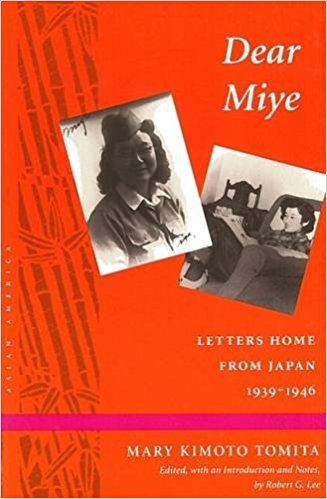Dear Miye: Letters Home from Japan, 1939-1946 (book)
Creators: Mary Kimoto Tomita
A collection of letters written by a young Nisei woman in Japan who becomes stuck there during World War II to her best friend who is still in California.
Synopsis
This compilation of letters begins with an introduction by the editor, Robert G. Lee, that provides context and some additional information about the period of her life from which the letters date. Mary Kimoto Tomita, the author of the letters, had been studying in Japan, and boarded a ship to return to California in December 1941. Pearl Harbor was attacked while the ship was at sea, and it was forced to return to Japan; Mary was thus forced to spend the war years in Japan with no ability to communicate with her family in California and with very few resources available to her.
The letters are all addressed to her best friend in California, Miye, and begin while Mary was still attending a school affiliated with a Japanese Christian organization called Rikkokai. In the prewar letters, Mary describes her experiences as a young Nisei woman, her conflicts with her host family due to her refusal to abide by the expectations Japanese conventions placed on her, her friendship with the son of the host family, her reflections on her relationship to Japan, and her hopes and dreams for the future. She was unable to send letters during the war, but the volume includes selections from a paper she later wrote in college detailing her difficult experiences from the attack on Pearl Harbor until the end of the war. She had few people she could depend on, and at one point agreed to an arranged marriage that was very soon dissolved because her husband immediately lost interest in her. She eventually moved in with a relative in the countryside who, while destitute, still made room for her and tried to care for her despite the dire circumstances across the country.
The letters to Miye resume with the end of the war and the beginning of the Allied Occupation of Japan--Mary found work with the Occupation Forces because she was bilingual. The Occupation-era letters include Mary's concern for her friend, her frustration with dating American GIs who were not as honorable as they first appeared, and her struggle to get her U.S. citizenship reinstated so that she could return to the U.S. Mary was finally able to leave Japan in 1946.
Author Background
Mary Kimoto was born in 1918 in the Central Valley town of Ceres, California. Her father was a member of the Rikkokai, a Japanese Christian group invested in establishing Japanese Christian agricultural colonies in the Americas. After returning to the U.S. in 1946, she settled in the Boston area where her parents had resettled after their wartime incarceration. She married Yoneo Paul Tomita in 1948, and the two moved to Oakland in 1950. She received a Masters in Library Science from Berkeley and worked as a librarian. She passed away in 2009 at the age of 90.
Response
Dear Miye was very well-received for providing a firsthand account of what it was like for a Nisei woman to experience World War II in Japan. It was lauded for having "exceptional merit" and "provide[ing] a fascinating, and often passionate firsthand description of Japanese, American, and Japanese American society from 'over there.'" [1] It was also praised for "chronicl[ing Tomita's] efforts to survive....in a voice of immediacy and authenticity." [2]
Might also like Seki-nin (Duty Bound) by George Nakagawa; The Two Worlds of Jim Yoshida by Jim Yoshida and Bill Hosokawa; Midnight in Broad Daylight by Pamela Rotner Sakamoto.
| Author | Mary Kimoto Tomita |
|---|---|
| Pages | 400 |
| Publication Date | 1995 |
For More Information
Burress, Charles. " Mary Kimoto Tomita dies: librarian, activist ." SF Gate , Apr. 3, 2009.
" Mary Kimoto Tomita, 'different' victim of Pearl Harbor, dies at age 90 ." Ceres Courier , Apr. 8, 2009.
Fujita-Rony, Dorothy. "A Shared Pacific Arena: Empire, Agriculture, and the Life Narratives of Mary Paik Lee, Angeles Monrayo, and Mary Tomita." Frontiers 34.2 (2013): 25-51.
Reviews
Daniels, Roger. Journal of American Ethnic History 16.2 (Winter 1997): 105-06.
Fujita-Rony, Thomas Y. Journal of Asian American Studies 1.1 (Feb 1998): 112-14.
Sood, M. Choice 33.1 (June 1996): 5931.
